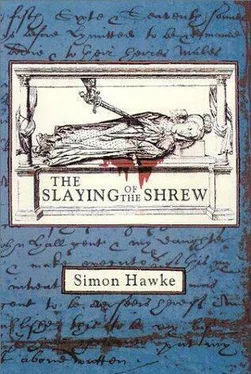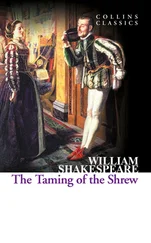Simon Hawke - The Slaying Of The Shrew
Здесь есть возможность читать онлайн «Simon Hawke - The Slaying Of The Shrew» весь текст электронной книги совершенно бесплатно (целиком полную версию без сокращений). В некоторых случаях можно слушать аудио, скачать через торрент в формате fb2 и присутствует краткое содержание. Жанр: Исторический детектив, на английском языке. Описание произведения, (предисловие) а так же отзывы посетителей доступны на портале библиотеки ЛибКат.
- Название:The Slaying Of The Shrew
- Автор:
- Жанр:
- Год:неизвестен
- ISBN:нет данных
- Рейтинг книги:5 / 5. Голосов: 1
-
Избранное:Добавить в избранное
- Отзывы:
-
Ваша оценка:
- 100
- 1
- 2
- 3
- 4
- 5
The Slaying Of The Shrew: краткое содержание, описание и аннотация
Предлагаем к чтению аннотацию, описание, краткое содержание или предисловие (зависит от того, что написал сам автор книги «The Slaying Of The Shrew»). Если вы не нашли необходимую информацию о книге — напишите в комментариях, мы постараемся отыскать её.
The Slaying Of The Shrew — читать онлайн бесплатно полную книгу (весь текст) целиком
Ниже представлен текст книги, разбитый по страницам. Система сохранения места последней прочитанной страницы, позволяет с удобством читать онлайн бесплатно книгу «The Slaying Of The Shrew», без необходимости каждый раз заново искать на чём Вы остановились. Поставьте закладку, и сможете в любой момент перейти на страницу, на которой закончили чтение.
Интервал:
Закладка:
“What do you mean, sir?” Camden bridled at him. “Are you suggesting I had aught to do with it?”
“Well, one never knows, does one?” said Braithwaite. “As Master Shakespeare said, ‘twould appear that one of us is anxious to eliminate his rivals and that one, for all we know, could very well be you.”
“Or it could just as well be you” Camden retorted, angrily. “I deeply resent your implication, sir!”
“Well, a man who stands ready to club down a fellow with a leg of mutton could be capable of anything,” said Braithwaite.
“You mock me, sir!”
“Tush, what use is there to mock a mockery?”
“Will!” Robert Speed came running up to them and, ignoring the two rivals, moved between them to tug at Shakespeare’s sleeve. “Where the devil have you been) And where is Tuck, for Heaven’s sake? Why, we have all been searching high and low for both of you!”
“Damn you!” said Camden, pale with fury. “I demand that you apologize at once!”
“Oh, forgive me, milord; I do humbly beg your pardon. I did not mean to interrupt,” said Speed.
“Not you, you simpleton, I meant this gentleman!” said Camden, indicating Braithwaite. “I shall not stand here and suffer to be ridiculed!”
“And yet you do it so very well,” said Braithwaite.
“Perhaps if we all took a moment-” Shakespeare began, but Speed began tugging on his sleeve again.
“We have set up the stage and have been trying to rehearse all day, but ‘tis a near impossibility without our book holder and the author of our play!” said Speed. “Kemp has lost all patience and has refused to proceed without you, for he does not like his scenes and demands changes, and Burbage has ordered everyone to spread out through the estate and find you-”
“Will you shut up!” said Camden.
“-and now there is all this talk of murder once again and no one even knows if we are to perform tomorrow-” “I said, shut up, you cursed fool!”
“Oh! Forgive me, milord,” said Speed, “I do humbly beg your pardon, but I thought that you were speaking to the other gentleman again.”
“Idiot!” said Camden, and lashed Speed viciously across the face with his leather glove.
“I say, that was uncalled for,” Braithwaite said. “See how you like a taste of your own broth.” He removed his glove and struck Camden in the face with it.
“Oh, God save us,” said Shakespeare, backing away hurriedly and pulling Speed along with him.
Camden ’s rapier sang free of its scabbard. “You shall die for that, you villainous churl!”
“Lay on, barrister,” said Braithwaite, drawing steel, “and damned be he that first cries, ‘Hold, enough!’ “ “A fight!” cried Speed.
“Gentlemen, please, put up your swords!” cried Shakespeare, but they were already engaged and a crowd quickly began to gather as the combatants dueled.
“Upon my word, what’s this?” asked Burbage, joining the assemblage as Braithwaite and Camden exchanged thrusts and parries.
“More than I had bargained for, I fear,” said Shakespeare.
“What had you to do with this?” asked Burbage.
“Everything and nothing,” Shakespeare said. “I stirred up this brew, I fear, but now have naught to do with the result.”
“I do believe they mean to kill each other,” Burbage said.
“Aye, look at ‘em go!” cried Speed, delighted with the spectacle, as indeed, were most of the observers, who cried out encouragement to one or the other of the combatants as they moved back and forth, their blades clanging against one another. The crowd surged back from them to give them room as they maneuvered. Camden lunged and Braithwaite parried, leaping backwards and knocking into the display board where the pies had been set out. Everything went crashing to the ground and the old man cried out and put his hands up to his head in consternation as his entire stall seemed in danger of collapsing, but Braithwaite recovered quickly and moved to the attack, and then Camden suddenly found himself on the defensive as he backed away, parrying furiously.
Shakespeare recalled that Smythe had said something about Camden wearing a duelist’s rapier, and indeed, the barrister seemed skilled, but Braithwaite was no slouch with a blade, himself. The two seemed evenly matched. As they moved back and forth, the crowd moved with them, growing by the minute as everyone present on the fairgrounds responded to the noise and came to see what was occuring. Camden lunged again, but Braithwaite parried his thrust and riposted quickly, catching the barrister off balance. Camden staggered back awkwardly as Braithwaite lunged. Camden seemed to parry the stroke, but fell back into the crowd as he did so. There was a collective cry as they caught him and shoved him back up again, but then with a gasp, Camden fell to his knees.
“A touch! A touch!” several voices in the crowd cried out.
Braithwaite shook his head, perplexed. “Nay, I never pricked him!”
“But look, he bleeds!” cried Speed.
On his knees, Camden dropped his blade and brought a hand up to his side. It came away bloody. He gasped with pain, staring at Braithwaite with wide-eyed incomprehension.
“But…’twas not me!” Braithwaite said. He examined the tip of his sword, then held it out towards Shakespeare. “See for yourself My blade is yet unblooded!”
“He speaks the truth,” said Shakespeare.
Camden pitched forward onto his face and lay motionless.
“Seize that man!” The cry came from an anguished Sir Richard, who had arrived upon the scene just in time to see his son fall dead onto the ground. “Seize him! There is your murderer! And he has killed my son!”
“I have murdered no one! And he drew steel first!” protested Braithwaite, looking around with alarm at the throng surrounding him.
“You challenged him!” shouted someone in the crowd, and then a scuffle suddenly broke out. More people started shouting and in the next moment, a well-dressed, older man was shoved out of the crowd to fall sprawling next to the slain Hughe Camden, only he fell with a cry, followed by a grunt of pain on impact, demonstrating that he was still very much alive.
“There is your killer, Sir Richard!” a familiar voice called out, and Shakespeare stared in astonishment as the grizzled old pie vendor stepped out from the crowd, only now he was no longer stooped over, but stood straight and tall, and there was nothing even remotely subservient in his bearing. He reached up and removed his eyepatch and the wig he wore and stood revealed as none other than Her Majesty’s own councillor and confidante, Sir William Worley. “I saw the blackguard stab your son from behind with a dagger when he fell back into the crowd.”
“Nay, ‘tis not true!” the man cried out, as he got up to his knees. “ ‘Tis entirely innocent I am!”
“Why, ‘tis the elder Chevalier Dubois!” Shakespeare exclaimed.
“Well, well,” said Worley, standing over him. “And here we all thought you were deaf, monsieur, and did not speak because you could not hear. Yet you seem to have recovered miraculously. And ‘tis even more miraculous that a nobleman from France should speak with a Cornish accent!”
From out of nowhere, it seemed, grim-faced men armed with swords and maces stepped out of the crowd and surrounded the faux Frenchman, and Shakespeare realized that Sir William had not returned alone, but had brought a squad of guardsmen with him. Dressed in ordinary clothing, they had blended with the crowd, standing by for Worley’s signal. The man’s face fell as he realized that his situation was completely hopeless.
Читать дальшеИнтервал:
Закладка:
Похожие книги на «The Slaying Of The Shrew»
Представляем Вашему вниманию похожие книги на «The Slaying Of The Shrew» списком для выбора. Мы отобрали схожую по названию и смыслу литературу в надежде предоставить читателям больше вариантов отыскать новые, интересные, ещё непрочитанные произведения.
Обсуждение, отзывы о книге «The Slaying Of The Shrew» и просто собственные мнения читателей. Оставьте ваши комментарии, напишите, что Вы думаете о произведении, его смысле или главных героях. Укажите что конкретно понравилось, а что нет, и почему Вы так считаете.












